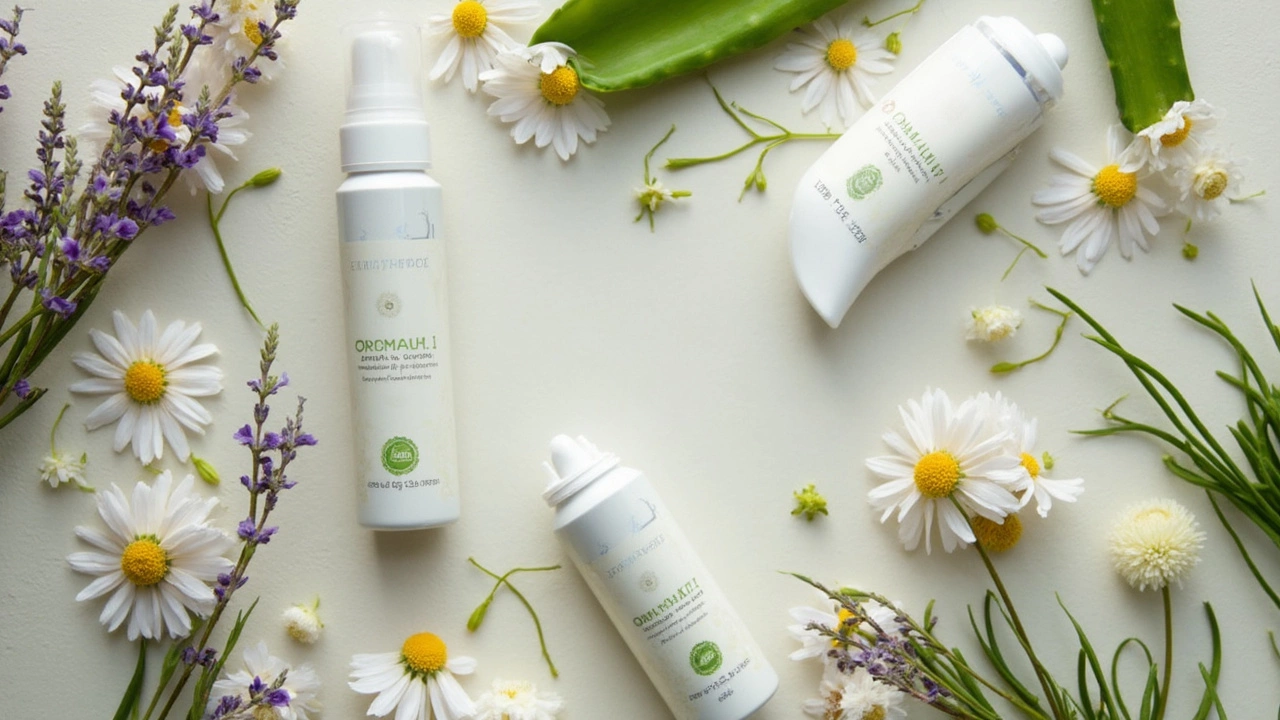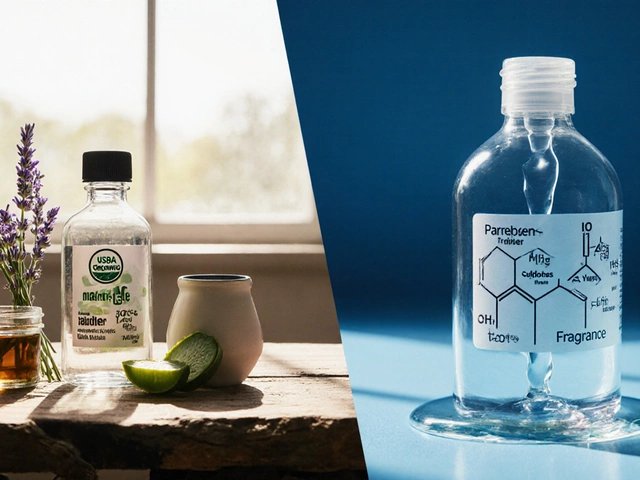So, you've probably heard about Eminence, known for its lush skincare products claiming to be organic. But, how do we know if they're really as green as they say? This isn't just some label we're talking about—it's your skin, and you deserve the truth.
First off, let's crack open this whole 'organic' label thing. Not every beauty product that screams 'organic' actually lives up to it. When brands like Eminence boast about organic ingredients, they're not just tossing around fancy words; they often have certifications to back it up. But the question remains—is Eminence checking all the boxes?
Diving into that ingredient list on your favorite Eminence product can feel like decoding a secret language. But, it's crucial. Understanding those labels can make the difference between genuinely organic and just another product riding the eco-friendly wave. We'll break down what makes an ingredient truly organic and how Eminence stacks up.
- Understanding Organic Certification
- Eminence's Ingredient Philosophy
- Decoding Product Labels
- Natural vs. Organic: What's the Difference?
- Tips for Choosing True Organic Products
- Conclusion: Is Eminence Worth It?
Understanding Organic Certification
When it comes to the world of organic skincare, words can be deceiving. Just because a product claims to be 'organic' doesn't mean it's 100% pure or natural. So, what exactly does it mean for a skincare product to be certified as organic, like those from Eminence?
Organic certification is not a one-size-fits-all deal. Different countries and organizations have their own standards. In the US, for instance, the USDA Organic seal is a popular marker. To snag this badge, a product must contain at least 95% organic ingredients, excluding things like water and salt. Products that meet these standards can display the USDA Organic label, giving consumers peace of mind.
Europe has its own rules with the COSMOS-standard, which ensures a unified certification process. COSMOS-certified products must have a minimum of 95% organic plant-based ingredients and also adhere to strict environmental and ethical standards during production.
- USDA Organic: At least 95% of the ingredients are organic.
- COSMOS Organic: At least 95% of the product’s plant-based ingredients are organic.
- Soil Association: Requires 95% of the ingredients to be organic for their seal.
Now, let's talk numbers. A report from 2023 highlighted that globally, sales of certified organic beauty products have been steadily climbing, reaching about $30 billion. Yes, billion with a 'B'! This shows that more of us are keen on grabbing truly organic skincare options. It's not just a trend; it's what people want in their beauty routines.
When choosing products, keep an eye out for these certifications. They're your shield against misleading labels. And remember, Eminence claims to use organic ingredients, but it's smart to check for these labels yourself to be sure you're getting the real deal. Being informed helps you make the best choices for your skin and the planet.
Eminence's Ingredient Philosophy
Alright, let's get down to the nitty-gritty of what Eminence stands for when it comes to their ingredients. These guys don't just talk the talk. They're all about using fresh, handpicked fruits, vegetables, and herbs straight from farms. Imagine your skincare jar filled with goodies like organic blueberries and apricot that are good enough to eat!
The brand claims it's super picky about what goes into your products. No synthetic additives and no nasty chemicals. But how do they pull this off? Well, they follow a strict standard inspired by European organic regulations, which many folks consider pretty darn reliable.
Here's a cool nugget: Eminence products often carry USDA Organic or Demeter certification logos on their labels. This isn’t just for show. These certifications have some of the toughest criteria, ensuring every step from soil health to harvesting is as clean as it gets.
We're talking about ingredients that are biodynamically grown, which means they focus on renewable resources and farming in harmony with nature. How awesome is that for your skincare? Instead of chemicals, they're bringing farm-fresh to your face.
Some of the standout ingredients they use are zingy lime, anti-aging rosehip, and hydrating coconut—each carefully chosen for their natural prowess. This not only makes for effective products but also satisfies the cravings of eco-conscious beauty lovers looking for true natural ingredients.
If you've ever wondered what happens behind the scenes, the team at Eminence does rigorous testing. They make sure every ingredient genuinely supports your skin's health and radiance without compromising on the green promises.
This really raises the bar for those who want more from their natural beauty and are committed to knowing exactly what touches their skin. Eminence isn’t just about hype; they're making a real effort to keep it real and organic—not just on the label but in every thoughtful formulation.
Decoding Product Labels
Do you ever find yourself squinting at a skincare label and wondering, "What does this really mean?" Navigating the world of organic beauty can be like trying to understand a new language. Let’s break it down a bit so you know exactly what you're slathering on your face.
When it comes to organic skincare, not all labels are created equal. A product might flaunt a 'natural' claim but still include synthetic ingredients. The key is understanding those claims and what stands behind them, especially with brands like Eminence.
Most reputable organic products, like those from Eminence, often carry a certification logo. Look for certifications like USDA Organic or ECOCERT. These ensure a certain percentage of the ingredients are indeed organic. Just seeing the word 'organic' on the front doesn't cut it. It needs that certifying emblem to truly stand out.
Dr. Leslie Baumann, a well-known dermatologist, once said,
“Just because a product says it’s organic doesn’t mean it’s natural, and vice versa. Always check the label!”
So what should we look for on these labels? Pay close attention to the first few ingredients listed. They're usually the most abundant in the product. If you spot a string of long chemical names or if the organic ingredients are way down the list, that’s your cue to be skeptical. Here's a quick guide:
- USDA Organic: This seal means the product is made of 95% or more certified organic content.
- Made with Organic Ingredients: Contains at least 70% organic content, but doesn’t meet the full USDA Organic criteria.
- No Seal? Be cautious and research further. Some might market themselves as ‘organic’ but lack legitimate certification.
Keep this cheat sheet handy when browsing for your next beauty find. It saves you from spending on products that aren't as 'green' as they claim, ensuring your skin gets the pure, wholesome care it deserves.

Natural vs. Organic: What's the Difference?
Alright, here’s the deal: not everything that's labeled as 'natural' is 'organic,' even though they sound like they’re from the same family. Let’s break it down.
First off, natural skincare products are usually made with ingredients found in nature instead of synthetic ones. So, think plant extracts, essential oils, and minerals. However, here's the catch: there are no strict regulations on stuff labeled 'natural.' Anybody could slap this word on a product, and it might still contain hidden synthetic sneaks.
Organic, on the other hand, is like the gold standard in the beauty biz. If something is truly organic, it means it’s made with ingredients that have been grown without nasty things like pesticides, sewage sludge, or genetically modified organisms. To get that organic certification, a product usually has to meet specific criteria set by certifying bodies like USDA Organic or COSMOS.
| Certifying Body | Region | Key Standards |
|---|---|---|
| USDA Organic | USA | No synthetic additives |
| COSMOS | Europe | Natural and organic ingredients |
But, here’s the kicker—not every ingredient in an organic product has to be organic; it depends on the percentage of organic ingredients required by different certifying bodies. That’s a bit of a head-scratcher, right?
So when you're eyeing an Eminence product, glance at the organic certification. This will clue you into whether its 'organic' label is legit. After all, knowing the difference between 'natural' and 'organic' is like getting a backstage pass to see which products really deserve that eco-friendly badge.
Tips for Choosing True Organic Products
Alright, so you're on the hunt for organic skincare that's truly about your skin and Mother Nature. But, with so many options out there, it's easy to get lost in the beauty aisle. Let's break down some tips to make sure you're picking the real deal.
First things first, always check for certifications. Legit organic products often carry certifications from recognized bodies like the USDA or ECOCERT. These stamps ensure that the products meet strict organic standards and aren’t just blowing hot air.
- Check Ingredient Lists: The shorter list, the better! Chemical-sounding names are usually a red flag unless they're naturally derived, like citric acid.
- Look for Transparency: Brands that openly share their sourcing and production methods generally have nothing to hide.
- Research Brands: Take a few minutes to check out how a brand talks about their organic ingredients. Do they detail their farming practices and manufacturing processes?
- Avoid Greenwashing: Just because the label has a leafy design doesn't mean it's organic. Watch out for marketing gimmicks.
- Test A Small Amount: Since organic products might have more natural oils and plant extracts, you can patch test to ensure compatibility with your skin.
Finally, remember, words like 'natural' or 'pure' aren't regulated, so they don’t always mean 'organic.' Stick to brands like Eminence that value authenticity.
| Certification | Meaning |
|---|---|
| USDA Organic | Product must contain at least 95% organic ingredients |
| ECOCERT | At least 95% of plant-based ingredients in the formula and a minimum of 10% of all ingredients by weight must come from organic farming |
Navigating the shelves with these tips should make finding the right organic skincare a whole lot easier. It can be a bit of homework, sure, but your skin (and the planet) will thank you for it!
Conclusion: Is Eminence Worth It?
Alright, so after digging through all this info, what's the deal with Eminence? Is it truly worth the hype and price? Given their strong commitment to using natural and organic ingredients, Eminence definitely stands out in the crowded beauty market. It's not just lip service—they have certifications like USDA Organic and Demeter that vouch for their organic farming and ingredient sourcing.
"Eminence products not only deliver results, but they're also gentler on the environment, making them a top choice for eco-conscious consumers," says Dr. Sarah Newman, a respected dermatologist.
But let's get real. Is it 100% organic? Not every ingredient can be organic, mainly because some need preservatives to keep products fresh. But Eminence does a solid job minimizing those elements and sticking to their eco-friendly roots as much as possible.
On the upside, users often rave about the texture and feel of these skincare goodies, with those who lean towards organic products considering them a must-have. Plus, the company's transparency with ingredient lists makes it easy for you to know exactly what you're putting on your skin.
If you're looking for genuine organic skincare and don’t mind spending a bit extra, Eminence seems to be a worthy addition to your cosmetic shelf. Just always make sure to read those ingredient labels and see if it aligns with what you’re comfortable using.
| Product | Organic Percentage | Price Range |
|---|---|---|
| Facial Recovery Oil | 95% | $76 - $79 |
| Stone Crop Gel Wash | 90% | $40 - $46 |
So, is it worth it? If you're leaning towards more natural options, then yes, Eminence is a pretty safe bet! Just remember, the ultimate decision lies with what fits best with your skincare goals and budget.


